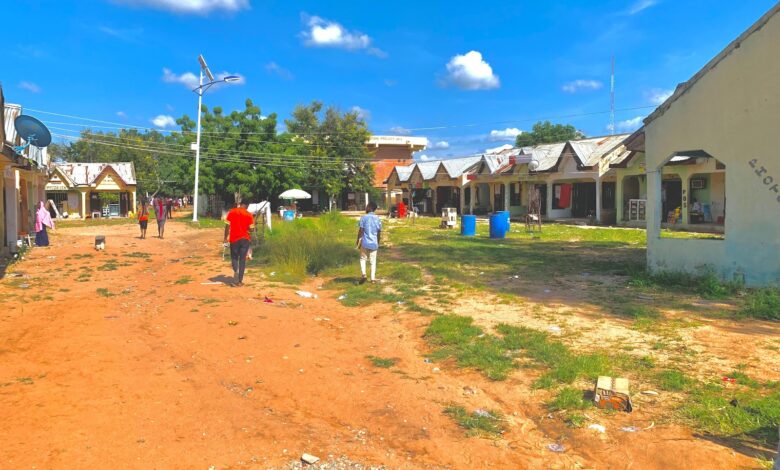Cost of Living Crisis: Education, Businesses Still Suffering Pain Of Subsidy Removal
Five months into the removal of fuel subsidies in Nigeria, many people are still suffering from the resulting cost of living crisis. Here we look at how it negatively affects students, teachers, and businesses in Adamawa State's tertiary institutions.

The removal of subsidies in Nigeria sent shockwaves throughout the country in May when it was announced, with clear repercussions felt acutely in the Adamawa State tertiary institutions, in Nigeria’s northeast. HumAngle had learnt that the additional burden felt by the already struggling students has caused more difficulties in their campus life.
Students who spoke to HumAngle explained how the new policy led to hyperinflation within and outside their school premises and that is making many students drop out or struggle to pay for transportation, accommodation and school fees that were already hiked by more than double across different Nigerian federal institutions.
The trickle-down effect of inflation reached the doors of universities with clear devastation, causing tuition fees to become unbearable for many. The tuition fees, often a considerable financial burden for students, have now become even more challenging to bear for poor students in universities and colleges.
“Things we used to buy for maybe ₦10 have doubled or even tripled,” said Goodwin Johnbaba, a 500-level student of Science Laboratory Technology at Modibbo Adama University, Yola.
Johnbaba explained that while the prices of everything he buys have skyrocketed, his income has remained static and that has forced him to cut his expenses in order to make some necessary ends meet. This is reflecting in his nutritional needs.
“I’ve now cut down the number of times I eat meat or fish in a week in order to balance up for other things needed in academics. In general, I cut down my wants and place a premium on settling all academic-related costs, even at that, there are times I lag. The impact of this fuel subsidy removal is just so enormous,” he said.

The removal of the fuel subsidy in Nigeria was intended to address economic challenges, but it has inadvertently placed a significant burden on students. The pursuit of higher education has become an even more formidable challenge for many.
Many students like Johnbaba have been left wondering how they could continue their education in the face of these new financial burdens. The campus experience, once synonymous with academic exploration and personal growth, had taken on a new, unsettling dimension.
Precious Daniel, a 100-level student of Business Administration at MAU, Yola narrated her ordeals: “Before the removal of subsidy, one gets a good monthly allowance without even asking my parents or guardian, but ever since the subsidy was removed, everything is now different,” she said.
But for her, everything has turned upside down. Despite the new hardships unsettling her way of living, she doesn’t get the support she yearns from her parents and guardians.
“Transportation [costs] have increased, prices of foodstuffs have increased and a lot of things which have really taken a toll on me, leaving me second guessing whether or not to even attend classes sometimes,” she explained.
When asked how she copes, Precious narrated “I sell doughnuts and eggs in the hostel where I raise more money to cater for some of my needs. Also, this situation needs prayer. With prayers and my little business, I have been able to cope to an extent.”

It’s the same story for another student, Elisha Rimamnde, a 500-level Microbiology student at MAU, Yola recounted his experience, “Transportation from Taraba State to Adamawa used to be 2500 naira, but it is now 4500 naira. The money I should be using for other necessities in school is now already spent on transportation even before stepping into school. Cost of foodstuff and many other things have increased,” he said.
Dividing himself between learning and work, Rimamnde is now forced to “run a computer business centre where I print as well as do project writings for students but due to the subsidy removal, I get low patronage. In order to cope, I perform my functions at a lower rate while I risk running at a loss.”

Not Only Students
The aftermath of Nigeria’s fuel subsidy removal has left no sector untouched. From the halls of academia, it has reached the bustling corners of campus enterprises. The repercussions of this policy change are rippling through the community.
For educators like Dahiru Abubakar, who holds the role of lecturer at Adamawa State Polytechnic Yola, the transition has demanded creative adaptation. “I noticed how scanty classes get at times and I observed it was related to transportation costs,” Mr. Abubakar pointed out.
In response, he’s embraced technology, recording select lectures and disseminating them via the class WhatsApp platform. This forward-thinking approach aims to accommodate students struggling with the rising cost of transportation, providing them with the flexibility to engage with course materials on their terms.
However, the consequences of subsidy removal extend far beyond the classroom, ensnaring businesses operating within the precincts of tertiary institutions. Mrs. Rakiya Bala, who operates a food stall at the Federal College of Education in Yola, paints a stark picture of the trials her restaurant business faces.
“The removal of subsidy has hit my business hard,” she lamented.
Previously known for offering affordable meals to students, Mrs Bala found herself compelled to hike menu prices. Escalating transportation costs for food supplies, combined with the overarching surge in foodstuff prices, left her little choice. The outcome has been a drop in daily sales as students grapple with the financial strain of sustaining themselves on campus. To mitigate fuel expenses, she also had to trim her operating hours, impacting her overall income.
Similarly, Caleb Paul, who operates a printing business catering primarily to students, shares a tale of adversity in these trying times. “Since the removal of the subsidy, our business has faced significant challenges,” Mr Paul disclosed.
His core clientele consists of students reliant on his printing services for assignments, course materials, and projects. With the uptick in fuel prices, transportation costs for essential supplies such as paper and ink have soared, prompting the inevitable—higher printing rates. Regrettably, this has dissuaded some students from utilizing his services, resulting in a marked decrease in demand. Furthermore, prolonged power outages, a byproduct of fuel scarcity, have hindered the timely execution of orders, leading to customer dissatisfaction.
While these individual accounts bear witness to the localized effects of subsidy removal, they also resonate with the broader narrative unfolding across Nigeria. Educators and entrepreneurs, driven by necessity, are rewriting the rules of engagement. The prevailing uncertainties present both challenges and opportunities as they seek to navigate the altered landscape.
Why Subsidy Removal?
Nigeria had long been a beneficiary of one of its natural resources – crude oil. Exporting crude oil formed the nation’s largest means of generating revenue. In order to keep the prices of fuel affordable, the Nigerian government has been subsidizing fuel for decades.
Subsidy on fuel was the measure put in place to support the average Nigerian from the volatility of global oil prices. Such measures ensured that costs of transportation, goods and services were manageable.
For the average student attending tertiary institutions in Nigeria and particularly Adamawa state, it meant costs of transportation, as well as living, were relatively stable. It made their lives safer.
The Nigerian government and economists have long been saying that the measure was unsustainable and rarely went to the people it was intended to support. According to them, the few rich people benefitted more than the majority of poor country people.
According to an article written by Felix Anyaruoh, a writer with Vanguard, the subsidy was “the primary cause of waste and income loss.” He explained that fuel subsidy payments take up a significant percentage of NNPC’s withholding and are susceptible to misappropriation and overspending.
This and a combination of other factors such as global failure in oil prices, shrinking government revenues and fiscal pressures as stated by President Bola Ahmed Tinubu forced the Nigerian government’s hand, leading to a reappraisal of this long-standing policy. The subsidy was no longer sustainable in the face of these challenges.
According to the Nigerian government, the removal of the subsidy was necessary to redirect funds towards critical infrastructure development, education, healthcare, and social services. It was a painful decision, one that was met with scepticism and concern from various quarters, including students and educators.
Since the removal of the subsidy, the government has promised to implement lots of measures that can lessen the effect that the removal has caused. However, few such measures have been implemented and people have continued crying over the cost of living.
Salaries and other benefits have so far not been increased despite the hyperinflation bedevilling ways of living. The Nigerian labour unions have threatened to go on strike if their demands of increasing minimum wage could not be met.
What Can Schools Management and Government Do?
Measures have been put in place to aid students’ transportation in tertiary institutions in Adamawa state. The Modibbo Adama University, Yola has buses at a subsidized rate for transporting students and staff to and from the university even before the removal of the fuel subsidy, although there are concerns as it relates to time and inadequacy of the transportation system.
Elisha Rimamnde noted the delay of take-off. He recalled “There is often uncertainty as to the take-off time of the bus as it depends on when the bus gets filled up. At times, one could spend over 30 minutes waiting for the bus to get filled up. At times one could even come when the bus is about to take off. In all, there is uncertainty with regards to the timing but the delay in take-off is more prominent”
In his bid to mitigate the effect of fuel subsidy removal, the Adamawa State Governor, Ahmadu Fintiri introduced 10 Innoson CNG-powered buses for local transportation in the state at a subsidized rate, few of which are already in use within the state capital.
Support Our Journalism
There are millions of ordinary people affected by conflict in Africa whose stories are missing in the mainstream media. HumAngle is determined to tell those challenging and under-reported stories, hoping that the people impacted by these conflicts will find the safety and security they deserve.
To ensure that we continue to provide public service coverage, we have a small favour to ask you. We want you to be part of our journalistic endeavour by contributing a token to us.
Your donation will further promote a robust, free, and independent media.
Donate HereStay Closer To The Stories That Matter




